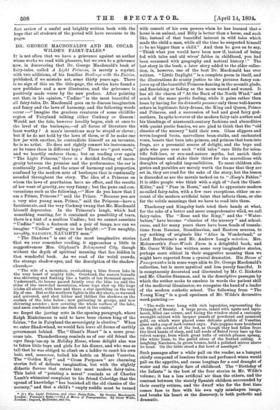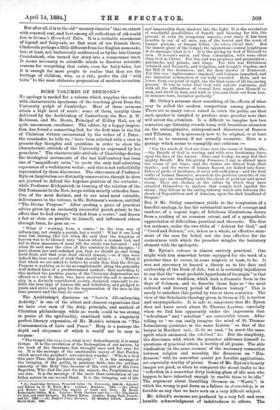DR. GEORGE MACDONALD'S AND MR. OSCAR WILDE'S FAIRY-TALES.* IT is
not often that we have a grievance against an author whose works we read with pleasure, but we own to a grievance
now, in discovering that Dr. George Macdonald's book of fairy-tales, called A Light Princess, is merely a reprint, with two additions, of his familiar Dealings with the Fairies, published, if we mistake not, some thirty years ago. There is no sign of this on the title-page, the stories have found a new publisher and a new illustrator, and the grievance is positively made worse by the new preface. After pointing out that, in his opinion, " Undine " is the most beautiful of -all fairy-tales, Dr. Macdonald goes on to discuss imagination and fancy and the laws of harmony, and the following words -occur :—" Imagine the gracious creatures of some childlike region of Fairyland talking either Cockney or Gascon ! Would not the tale, however lovelily begun, sink at once to the level of the burlesque,—of all forms of literature the
least worthy A man's inventions may be stupid or clever ; but if he do not hold by the laws of them, or if he make one law jar with another, he contradicts himself as an inventor, he is no artist. He does not rightly consort his instruments, or he tunes them in different keys." These are " goot worts," and we heartily endorse them; but on reading over again
1' The Light Princess," there is a decided feeling of incon- gruity between the promise and the performance, the ear is continually jarred, and the sense of harmony and proportion -confused by the modern note of burlesque that is continually sounded throughout the story. The idea of a Princess on whom the laws of gravitation have no effect, and the results of her want of gravity, are very funny ; but the puns and con- sersations such as the following,—" How do you know that I am a Prince, Princess ? " said the Prince. " Because you are a very nice young man, Prince," said the Princess—have a facetious air, and the very Cockney twang that Mr. Macdonald
himself deprecates. In the Princess's laugh, which had something wanting, for it contained no possibility of tears, there is a hint of a soulless Undine ; but we cannot associate -" Undine" with a footman and a pair of tongs, nor can we
imagine " Undine saying to her knight :—" You naughty, naughty, NAUGHTY, NAUGHTY man."
" The Shadows " is one of the most imaginative stories that we ever remember reading, it approaches a little in suggestiveness Mrs. Oliphant's Beleaguered City, though
without the depth of spiritual meaning that lies hidden in that wonderful book. As we read of the weird crowds, the strange shadow-eyes, and the description of the shadow- church,—
" The side of a mountain, overlooking a blue frozen lake in the very heart of mighty hills. Overhead, the aurora borealis was shivering and flashing like a battle of ten thousand spears. Underneath, its beams passed faintly over the blue ice and the sides of the snowclad mountains, whose tops shot up like huge icicles all about, with here and there a star sparkling on the very tip of one. But as the northern lights in the sky above, so wavered and quivered, and shot hither and thither the shadows on the surface of the lake below ; now gathering in groups, and now shivering asunder ; now covering the whole surface of the lake, and anon condensed into one dark rent in the centre," we forget the jarring note in the opening paragraph, where Ralph Rinkelmann is said to have been chosen king of the fairies, "for in Fairyland the sovereignty is elective." When -we enter Shadowland, we would fain leave all forms of earthly government behind. The " Giant's Heart " is a more grue- some tale. Thunderthump reminds us of our old friend the ogre Snap-'em-up in Holiday House, whose delight also was 'to fatten little boys and girls for his dinner, and who was so -tall that he was obliged to climb on a ladder to comb his own hair, and, moreover, boiled his kettle on Mount Vesuvius. The " Golden Key " and " Cross Purposes " are charming -stories full of delicate imagination, but with the slightly didactic flavour that enters into most modern fairy-tales. This habit of "pointing a moral" reminds us of Charles Lamb's whimsical complaint to his friend Coleridge that the
spread of knowledge " has banished all the old classics of the nursery," and that a child's " empty noddle must be turned
• (1) The Light Princess, and other Fairy-Talss. By George Macdonald. Loudon: Putnam's Sons.—(2.) A House of Pomegranate& By Oscar Wilde. London: Osgood. McHraine, and Oo. with. conceit of his own powers when he has learned that a horse is an animal, and Billy is better than a horse, and such like, instead of that beautiful interest in wild tales which made the child a man, while all the time he suspected himself to be no bigger than a child." And then he goes on to say, " Think what you would have been now if, instead of being
fed with tales and old wives' fables in childhood, you had been crammed with geography and natural history !" The last story in the book, a later story added to the older collec- tion, is, however, one of the best Dr. Macdonald has ever written. "Little Daylight " is a complete poem in itself, and the illustrations do scanty justice to the pictures fancy con- jures up of the beautiful Princess dancing in the moonlit glade, and flourishing or fading as the moon waxed and waned. It has all the charm of "At the Back of the North Wind," and much of the same poetic feeling, while it gains rather than
loses by having for its dramatis persona' only those well-known actors in legitimate fairy-drama, the King and Queen, Prince and Princess, and a succession of bad and good fairy god- mothers. In spite however of the modern fairy-tale author and his blendings of nineteenth-century fashions and absurdities with quaint poetic fancies, we are glad to think that the "old classics of the nursery" hold their own. Glass slippers and
seven-leagued boots, marvellous bean-stalks, and enchanted roses, beasts that turn into princes, and princes that turn into frogs, are a perennial source of delight, and the boys and girls who pore over such "wild tales" care little for 'scien- tific folk-lore, or sun-and-nature myths, but enrich their imaginations and slake their thirst for the marvellous with draughts of splendid impossibilities. To most children alle- gories and parables are merely worth the frame that they are set in, they are read for the sake of the story, but the lesson is discarded as are the morals tacked on to " /Esop's Fables." It is older people who think with a sigh of " Jack the Giant- Killer," and " Puss in Boots," and fail to appreciate modern so-called fairy-tales, with a few rare exceptions, either on ac- count of the modern artificial taint that infects them, or else for the subtle meanings that we have to read into them.
Thackeray and Kingsley both tried their hands at what, for the sake of a better and more comprehensive Ward, we call fairy-tales. The "Rose and the Ring," and the "Water- babies," have become " classics of the nursery " and school. room, and for many years there have been floods of transla- tions from Russian, Scandinavian, and Eastern sources, to say nothing of originals like "Alice in Wonderland," or Lord Brabourne's and Mr. Andrew Lang's mtirchen. Mrs. Molesworth's Four-Winds Farm is a delightful book, and Mr. Oscar Wilde has written some very imaginative stories, perhaps more ethical in their suggestive meaning than we might have expected from a cynical dramatist. His House of Pomegranates is in some ways akin to Dr. George Macdonald's collection, but is more mystical and less purely fanciful. It
is sumptuously decorated and illustrated by Mr. C. Ricketts and Mr. Charles Shannon, and in the descriptive passages by which the author seeks to emulate in words the patient skill of the medkeval illuminator, we recognise the hand of a leader
of the modern msthetic school. The following from " The Young King" is a good specimen of Mr. Wilde's decorative word-painting:- The walls were hung with rich tapestries, representing the Triumph of Beauty. A large press, inlaid with agate and lapis- lazuli, filled one corner, and facing the window stood a curiously wrought cabinet with lacquer panels of powdered and mosaiced gold, on which were placed some delicate goblets of Venetian glass and a cup of dark-veined onyx. Pale poppies were broidered on the silk coverlet of the bed, as though they had fallen from the tired hands of sleep, and tall reeds of fluted ivory bare up the velvet canopy, from which great tufts of ostrich plumes sprang, like white foam, to the pallid silver of the fretted ceiling. A laughing Narcissus, in green bronze, held a polished mirror above its head. On the table stood a flat bowl of amethyst."
Such passages after a while pall on the reader, as a banquet chiefly composed of luscious fruits and perfumed wines would
pall on the appetite, and cause longings for a cool draught of water and the simple fare of childhood. The " Birthday of the Infanta" is the best of the four stories in Mr. Wilde's volume; it has a less artificial air than the others, and the contrast between the stately Spanish children surrounded by their courtly retinue, and the dwarf who for the first time comes face to face with his own ugly misshapen image, and breaks his heart at the discovery, is both pathetic and dramatic.
But after all, it is to the old "nursery classics " that we return with renewed zest, and best among all collections of old-world lore is Grinsm'8 Household Tales. It is a veritable storehouse of legend and fairy-tale, we find most of our friends there, Cinderella perhaps a little different from her English namesake, but, at least, not barbarously maltreated as by the late George Cruickshank, who turned her story into a temperance tract. It seems necessary to scientific minds to discover scientific reasons for everything that exists, even for fairy-tales, but it is enough for most people to realise that they are the heritage of children, who, as a rule, prefer the old "wild tales " to the most elaborate preparation of modern invention.



































 Previous page
Previous page